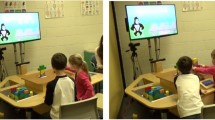Abstract
We believe that wearable computers combined with a performance support system could be a useful resource for mobile workers. Literature provides little guidance as to whether this is a feasible solution for aiding mobile workers in the performance of their tasks. In order to evaluate the feasibility of this concept an initial study was conducted. This initial study compared a voice-activated, computer-based performance support system with a book for learning and performing three simple tasks. The study demonstrated the feasibility of aperformance support system on a wearable computer, but did not show it to be superior to the book in this context. Guidance on the design of future performance support systems and suggestions for future studies are provided.
Similar content being viewed by others
References
Bruegge B and Bennington B. Application of wireless research to real industrial problems: Application of mobile computing and communication. IEEE Personal Communications, 1996; 3(1):64–71.
Horvitz E and Shwe M. Handsfree decision support: Toward a non-invasive human-computer interface. Proceedings of 19th Annual Symposium of Computer Application in Medical Care, 1995; 955–959.
Baudhuin SE. Telemaintenance applications for The Wearable PC. Proceedings of the 15th AIAA/IEEE Digital Avionics Systems Conference, 1996; 407–413.
Kraut RE, Miller MD and Siegel J. Collaboration in performance of physical tasks: Effects on outcomes and communication. Proceedings of Computer Supported Cooperative Work '96, 1996; 57–66.
Abowd GD, Atkeson CG, Hong J, Long S, Kooper R and Pinterton M. Cyberguide: A mobile context-aware tour guide. Wireless Networks, 1997: 3(5): 421–433.
Brown PJ and Bovey JD. Wearable computers as an aid to human memory. IEEE Colloquium, 1995;140(6): 1–3.
Starner T, Mann S, Rhodes B, Levine J, Healy J, Kirsch D, Picard RW and Pentland A. Augmented reality through wearable computing. Presence, 1997; 6(4): 386–398.14. Carroll JM. The Nurnburg Funnel: Designing minimalist instruction for practical computer skill. MIT Press, Cambridge, MA. 1990.
Gery GJ. Electronic Performance Support Systems. Weingarten Publications, Boston, MA. 1991.
Ockerman JI, Najjar LJ, Thompson JC, Arkinson FD and Treanor CJ. FAST: A research paradigm for educational performance support systems. Educational Multimedia and Hypermedia, 1996; 545–550.
Gery G. (Ed.) Special issue on electronic performance support systems. Performance Improvement Quarterly, 1994; 8(1).
Najjar LJ, Ockerman JJ, Thompson JC and Treanor CJ. Building a demonstration multimedia electronic performance support system. Educational Multimedia and Hypermedia, 1996; 794.
Najjar LJ. Multimedia information and learning. Journal of Educational Multimedia and Hypermedia, 1996; 5: 129–150.
Najjar LJ. A Review of the Fundamental Effects of Multimedia Information Presentation on Learning (GIT-GVU-95-20). Georgia Institute of Technology, Graphics, Visualisation, and Usability Centre, Atlanta, GA. 1995.
Author information
Authors and Affiliations
Corresponding author
Rights and permissions
About this article
Cite this article
Ockerman, J.J., Najjar, L.J. & Thompson, J.C. Wearable computers for performance support: Initial feasibility study. Personal Technologies 1, 251–259 (1997). https://doi.org/10.1007/BF01682028
Issue Date:
DOI: https://doi.org/10.1007/BF01682028




